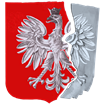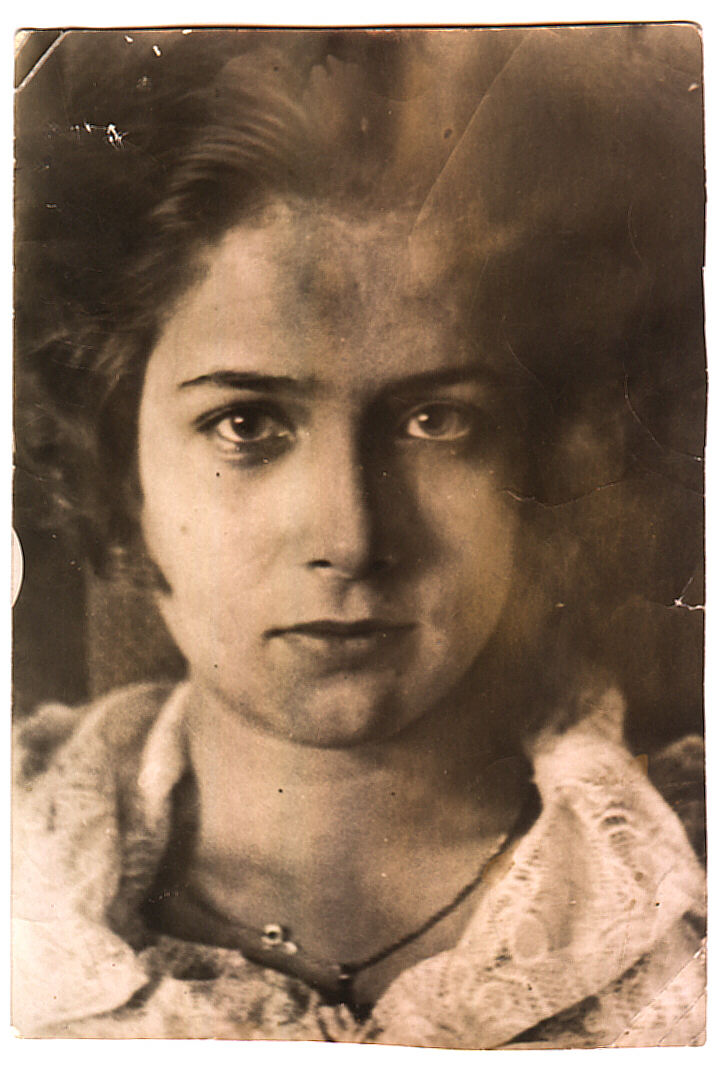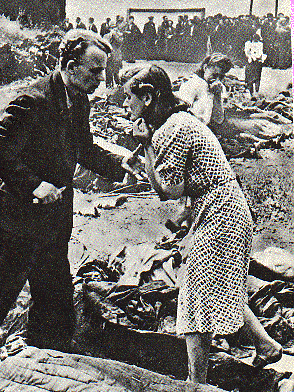Part Two – The USSR and Gulag


Janina Sulkowska, 1934

Forest Centre No.5, Sukhobezvodnaya by T. Sobierajski

Relatives search for loved ones murdered by NKVD in Lwów
“Dry-Without-Water”
Our trip lasted several days and nights. We passed Moscow one night and kept heading in a north-easterly direction; nobody had the faintest idea where we were bound. Early one morning, 120 kilometers north of Gorky, the train simply stopped in the middle of a field away from any town, and we were ordered off. This region was called Sukhobezvodnoe (literally Dry-Without-Water) and there were about 15 camps here with perhaps 10,000 prisoners.
A several-hour long march in overpowering heat brought us to our destination which was more of a transit camp than a labour camp–though we we’d be put to hard labour almost immediately. Crude barracks surrounded by barbed wire and a wooden palisade with guard-towers on the corners. A forbidding and lonely place.
But dramatic news greeted us. Two days earlier on June 22, 1941, Nazi Germany had attacked her former ally the Soviet Union. So the rumors were true! All the Polish prisoners were overjoyed as our traditional enemies were now at each other’s throat. Hitler and Stalin would destroy each other–and in the process lay our deliverance from the USSR. The Soviet prisoners thought we were crazy. No one ever escaped the USSR
My Friends are Murdered
But little did we realize that in the wake Operation Barbarossa, the Soviets were carrying out mass, panic-executions of prisoners in Poland. As many as 120,000 people, mostly Poles and Ukrainians, would be murdered in a matter of a few days by the Soviets in their cells or during evacuation to the USSR. We would only learn of the atrocities later. In the prisons of Lwów, the NKVD herded inmates into cellars and machine-gunned over 12,000 of them.
Elsewhere, prisoners including children, were scalded to death in hot water or had ear, eyes, noses cut off as NKVD sadists and their collaborators went on a rampage. Entire prison populations were being massacred by the NKVD who desperately bricked-up buildings full of corpses and still-living victims, even as the Wehrmacht was closing in.
In Dubno jail where I had just spent a year, Major Vinokur and his staff, many of then drunk, raced from cell to cell ordering prisoners to stand up and then spraying them with bullets. They would then enter the cells to finish off the wounded by shots to the head or with bayonets. Several hundred were murdered that way. In my hometown of Krzemieniec similar scenes were unfolding, though I would only learn of the mass-murders years later.
Teresa Trautman, Bronek Rumel, Jerzy Bronikowski, Ryszard Kasprycki, Tadeusz Majewski, and other friends and underground members, were murdered in Dubno on that day, or earlier as a result of torture or death sentences. Teresa’s mother went to the jail after the killings and was forced to search ankle-deep in dried blood for her daughter’s corpse even as German sanitation units were cleaning the cells in anticipation of more Polish prisoners. Teresa was buried in Dubno cemetery. Bronek’s body was never recovered. I had been transferred from Dubno and had missed these mass executions by barely three months. Only years later would I find out how close I came to death. This was another instance when fate seemed to have plucked me out just in the nick of time, and it would not be the last.
We were quickly put to work stripping cut trees and loading them into wagons. After months or years in prisons on starvation diets it was very hard work. Many women suffered hernias, broken limbs, or simply collapsed from exhaustion. Climbing through logs and stubble, I cut my legs and feet which, aggravated by insect bites, left me with chronic running sores. It was here that I would last menstruate for almost a year and a half. Under the conditions this was a godsend, though I often worried if I would return to being a woman again.
One day we were brought in early from work to a barrack and ordered to sit on stools and benches. The barrack was soon filled with prisoners, women and men. It was a trial. We were ordered to stand up as the circuit court entered to try three Polish officers for escape, two of them for thrice attempting the crime. A few words in Russian and the court sentenced them to death. The lesson was not lost on us.
Here I met Father Pluta who had been arrested at his parish in Wolyn and condemned to death. He was imprisoned in Kiev where his sentence was commuted to 10 years at hard labour, and he was here awaiting transfer to the labour-camps. But then some of us again were being taken on the transports. I quickly said good bye to Father Pluta and to Granny who had been with me almost from the start, and who was remaining behind in a cell with Polish women who would take care of each other. I would never see her again, but Father Pluta I would, and we became lifelong friends.
Camp No. 2
This was a huge self-sustaining camp with over a thousand prisoners of whom about 200 were female. The major enterprise here was brick-making which included numerous kilns, as well as farming. The women were housed in a huge barrack separated from the rest of the camp by a metal net. Only Marzenka and a couple of others remained of our group, but additions were made including Ziuta Horodynska and Frania, a Jewish student from Lodz. In our barrack there were a number of political prisoners from Lwów, as well as Romanians, Czechs, Slovaks, Ukrainian Poles, Gypsies, Tartars, and a large contingent of Russians. Some of these Russians were kept in their own dormitory which was accessible by a side door near the main entrance. Most of these were the cultural elite of Russia. Included was a conservatory professor who taught the camp commandant’s children and ran the prisoner’s choir, a singer from Radio Moscow, and a dancer from Tashkent who thrilled us with her Spanish dances and who’d been arrested because her husband was Polish. There were choreographers, directors and other talented people who were able to find hidden talent even among the thieves and prostitutes, and we enjoyed a number of amazing performances. The front part of our barrack was the territory of the blat [violent gangs of criminals]–killers, prostitutes and other criminals. Unfortunately some of our younger Polish girls fell in with this lot and were lost, in spite of our efforts to keep them with us.
The Glory of Soviet Work
The Poles were put to work in the brick factory. A typical day began with rising at 3 a.m.and a bowl of soup with a bit of bread. By 4 a.m. we were standing in our work-brigades at the gate where the head-count would take place. This was a complicated affair as there were always stragglers or those who refused or were unable to go to work. The guards would drag prisoners from their bunks, beating and kicking them mercilessly. Most of them were simply too tired or sick to work and were at the point of death. All this activity would be accompanied by an accordionist, a fellow-prisoner, playing “uplifting” music from a platform. To some Soviet song, we’d at last march out past the forbidden zone where we’d be counted one last time before being given over to a strilok [armed guard] who’d intone: “A step to the left, a step to the right, will be seen as an escape and I’ll use my weapon without a warning!” By 5 in the morning we were required to be on our hour-long march to work supervised by the convoy commandant upon his huge horse.
The work was very heavy. I was with a group carrying pieces of clay to the kiln on large pallets with tandem handles, where they’d be baked into bricks, and carried back in a similar way. The bricks were still hot, and a huge hole was burned in my coat when my partner stumbled showering me with steaming bricks. We also transported raw clay in wheelbarrows along swaying planks. Mornings were cool while afternoons were blisteringly hot. Just before the sun reached it’s zenith, we were allowed a lunch break, though there wasn’t anything to eat except what one saved from breakfast–and this would be chewed slowly. We would drink a little water, roll cigarettes, and spend lunch break resting and talking. At 5 in the afternoon we’d be re-assembled into brigades, counted, and marched back to camp–a group of people barely able to lift their feet. For dinner in the mess hall we’d receive a bowl of soup without bread. After our meal we could go to the sick ward, meet acquaintances, do laundry or sewing. It would be close to midnight when sleep would finally be possible, after the last head-count and when the conversations and activities stopped. We all tried to avoid the Kawecze [propaganda officer] whose job was to spread Soviet joy among us…just as we wanted to go to sleep. This position was usually filled by a junior official who made up for his stupidity and lack of imagination by persistence. But sleep, when it did come, was also an ordeal as we were tormented by fleas and lice as well as mosquitoes. The chronic lack of sleep and fatigue bothered most of us much more than the constant hunger, and together they spelled death for many of the older women.
Eventually the women were put into permanent work brigades: two Polish teams and several Soviet ones. Our brigade leader was Keller, a tough German who pushed us without pity. Thanks to her we were able to meet our work-quota, and thus could feed from the best No. 1 cauldron. After several weeks of toiling under the relentless Keller, we discovered our group was featured on the bulletin board as a Stakhanovite brigade [workers who exceed quotas] that had been completing 140% of our quota, ahead of everyone else! We felt it a useless honor that was not worth the effort, and fought with Keller who cut back her demands but maintained the discipline.
Some of the hardest work was in tending fields of potatoes and beets which involved carrying water in wooden buckets for long distances, sometimes uphill–work that left every muscle screaming. My boots were too heavy for this summer work and I preferred bare feet. As a result the cuts and sores on my legs and feet deteriorated into a festering mess. But we also had the chance to steal a potato and eat it secretly. Other tasks given to our brigade was in the clearing of roots and rocks after a forest stand had been cut down.The summer heat was oppressive; lightning might flash but hardly a drop of rain ever fell. Our sunburn and blisters were treated by a balm which we smeared over our wounds, or even drank in a diluted form as a cure for diarrhea. I covered myself head to foot with this stinking mess, as my leg and foot sores were spreading upwards while my mosquito bites were turning into chronic scabs.
Christopher Jacek Gladun was born in 1951 and grew up in Canada to where his family emigrated from England as displaced persons. Sadly, Chris died in Toronto in March 2003. He held a diploma in Journalism from the Niagara College and a BA in Polish Language & Literature from the University of Toronto. Chris also acted as interviewer and researcher for the documentary film “Rescued From Death in Siberia”.
This content is now maintained by the Kresy-Siberia Group, which Chris was a charter member of and which is taking his website and his research work forward.